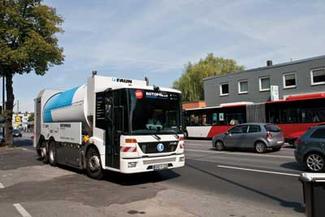
Berlin specialist in energy storage solutions obtains order for fuel cell system solution for garbage collection vehicle
Heliocentris Fuel Cells AG is a specialist for clean energy storage solutions based on a smart combination of batteries, fuel cells and energy management, is developing in collaboration with FAUN Umwelttechnik GmbH & Co. KG, the European market leader for disposal vehicles, a hybrid waste disposal vehicle with significantly reduced noise and exhaust emissions for BSR (Berliner Sanitation).
Cities and local authorities are increasingly facing the challenge to make a considerable reduction in noise and exhaust emissions. This trend is accelerated by the ever wider expansion of environmental zones and more stringent requirements. Especially in the field of municipal vehicles – waste disposal, for example – due to significant noise and exhaust emissions there is fundamental potential for innovative and environmentally friendly energy and propulsion solutions.
As in the automotive vehicle market, a trend towards introducing electrical supply solutions to reduce emissions is emerging also in the field of municipal special vehicles. The amount of energy required is so high that pure battery solutions are out of the question for many vehicles.
A hybrid storage solution with fuel cells that can use the extremely high energy density of hydrogen is therefore a superior and practicable solution for such vehicles. Since municipal vehicles are generally used in fleet operation, the introduction of the necessary hydrogen infrastructure can be implemented at acceptable cost.
In this context, a powerful consortium headed by BSR was formed: BSR as the biggest municipal disposal company in Germany, FAUN as the European market leader in collection vehicles and road sweepers and Heliocentris as a leading company in the field of clean energy storage solutions. The objective of the joint project is to develop a modern garbage collection vehicle that is appropriate to the increasing environmental requirements.
The garbage collection vehicle prototype will have an onboard hydrogen-powered fuel cell energy system. This allows the main drive (diesel engine) to be switched off during collection, so that it only has to be used when the vehicle is driving. Using a system like this, up to 3 litres of diesel fuel are saved per hour, which translates to a reduction in diesel consumption of almost 30 percent.
Therefore, CO2, NOx and fine particle emissions are also reduced. The main objective of the prototype is to demonstrate the suitability for daily use of an electrical propulsion system with a fuel cell for garbage collection by a Rotopress garbage collection vehicle.
With regard to the prototype, Heliocentris focuses on design and integration of the 32 kW fuel cell unit as well as the hydrogen tank system as a vehicle subsystem. In addition, FAUN is supported in the vehicle integration with regard to energy management and safety functions and the BSR in the testing operations.
On top of developing the prototype vehicle, extensive testing is conducted under real operating conditions in the context of the demonstration project. If these tests are concluded successfully, a larger field test could follow in the second phase, using a small fleet of garbage collection vehicles.
Dr. Henrik Colell, CEO of Heliocentris is very happy about the order: “We are very proud to be able to realise this promising vehicle project in the consortium with the leading companies BSR and FAUN. This is another important milestone in the implementation of our strategy to position ourselves as a company on the market for energy storage solutions for special vehicles.”
“Berliner Stadtreinigung is a forward-looking company”, says BSR CEO, Vera Gäde-Butzlaff. “For us, launching and promoting innovations is an important aspect in implementing our strategy of low fees and high ecological standards.” According to Gäde-Butzlaff, part of this is encouraging creative companies, as well as promoting medium sized enterprises. “In technical innovations, our concern is economic viability, as well as climate and environmental protection. Of course, the ideal situation would be that both were attainable, as is anticipated from this project.”
The project is supported by the German Federal Ministry of Transport, Building and Urban Development in the framework of the Nationale Innovationsprogramm Wasserstoff- und Brennstoffzellentechnologie (NIP). Responsible for coordination of the NIP is the NOW GmbH Nationale Organisation Wasserstoff- und Brennstoffzellentechnologie.



